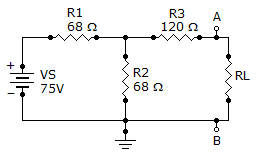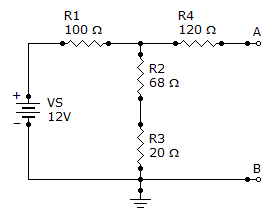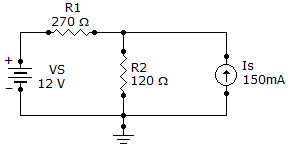Discussion
Home ‣ Electrical Engineering ‣ Series Circuits See What Others Are Saying!
- Question
A series circuit consists of a 4.7 kΩ, a 12 kΩ, and a 2.2 kΩ resistor. The resistor that has the most voltage drop is
Options- A. the 12 kΩ
- B. the 2.2 kΩ
- C. the 4.7 kΩ
- D. impossible to determine from the given information
- Correct Answer
- the 12 kΩ
- 1. Determine IN for the circuit consisting of VS, R1, R2, and R3 shown in the given circuit.

Options- A. 676 mA
- B. 245 mA
- C. 431 mA
- D. 75 mA Discuss
- 2. Referring to the given circuit, determine VTH and RTH if a 68 Ω resistor is connected in parallel across R2 and R3.

Options- A. 3.3 V, 148 Ω
- B. 330 mV, 148 Ω
- C. 3.3 V, 68 Ω
- D. 330 mV, 68 Ω Discuss
- 3. What is (79 × 106)/(12 × 10?8)?
Options- A. 6,580 × 1012
- B. 658 × 1010
- C. 6.58 × 1014
- D. 0.658 × 1016 Discuss
- 4. What is the voltage drop across R1?

Options- A. 850 mV
- B. 7.82 V
- C. 9.18 V
- D. 918 mV Discuss
- 5. Find the current through R2 of the given circuit.

Options- A. 30.7 mA
- B. 104 mA
- C. 74 mA
- D. 134 mA Discuss
- 6. With an RL integrator, at the instant of the rising pulse edge,
Options- A. all the input voltage is across the resistor
- B. all the input voltage is across the inductor
- C. 63 percent of the input voltage is across the resistor
- D. 63 percent of the input voltage is across the inductor Discuss
- 7. If the capacitor in an integrator opens, the output has the same voltage as the input.
Options- A. True
- B. False Discuss
- 8. Ampere-turn is the unit of magnetomotive force (mmf).
Options- A. True
- B. False Discuss
- 9. Hysteresis is the number of lines of force per unit area in a magnetic field.
Options- A. True
- B. False Discuss
- 10. To understand how the output voltage is shaped by a differentiator, you must consider
Options- A. the response to the rising pulse edge
- B. the response between the rising and falling edges
- C. the response to the falling pulse edge
- D. all of the above Discuss
More questions
Correct Answer: 245 mA
Correct Answer: 3.3 V, 148 Ω
Correct Answer: 6.58 × 1014
Correct Answer: 7.82 V
Correct Answer: 134 mA
Correct Answer: all the input voltage is across the inductor
Correct Answer: True
Correct Answer: True
Correct Answer: False
Correct Answer: all of the above
Comments
There are no comments.More in Electrical Engineering:
Programming
Copyright ©CuriousTab. All rights reserved.
